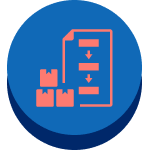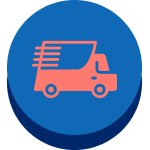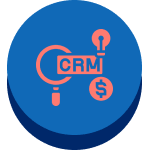The supply chain is filled with complex and extremely intricate processes occurring simultaneously and across the entire world. Managing it all can get increasingly challenging. Especially, when unpredictable events like the pandemic or geopolitical issues come and wreak havoc on the operations companies have already set up.
Hence, organizations are implementing various logistics software solutions to help tackle the challenges of managing the complex supply chain. However, with so many IT options on the market, it can be hard to decipher which ones your business truly needs.
So, we’ve decided to make a roundup of the main types of supply chain management software for company leaders to consider. Keep on reading to discover what they are.
Why Does the Supply Chain Require Multiple Types of Software?

As we said, the supply chain is highly complex, with lots of moving parts, where even the tiniest mistake or issue could lead to thousands of dollars worth of losses. Naturally, this kind of wide spanning operation requires different types of supply chain management (SCM) software that can help coordinate the various areas of the business.
Of course, not every company will use all of the SCM systems we outline below, but the majority likely rely on a combination of at least a few. Or, some might choose to integrate software into one all-encompassing platform.
10 Crucial SCM Software Types
It’s important for business leaders to be aware of the SCM applications that could help them improve operational performance and outpace competitors. That way, deciding which tools are optimal for your company will be a lot easier.
So, without further ado, let’s go through the top examples of supply chain management systems that are out there today.
1. Order Processing

As the name suggests, this type of supply chain management system helps with order processing activities. Since the speed at which you can process any new request affects client satisfaction and ultimately revenue, it’s important for this area of the business to be highly efficient.
So, organizations typically implement these kinds of tools when they want to automate and speed up a large chunk of daily operations. Hence, an efficient solution should be capable of:
- Order fulfillment processing
- Order tracking
- Automated billing
- Paperless PO and invoice generation
By automating these aspects of the supply chain, the system allows your employees to focus on more value-generating activities rather than repetitive paperwork administration. Plus, these solutions tend to minimize human errors.
2. Truck Dispatching

Trucking dispatch software simplifies the work of supply chain firms by automating truck routing, monitoring the condition of delivery vehicles, simplifying scheduling activities, and the like.
If you’ve got highly time-consuming stakeholder communication, frequently experience routing difficulties, or find yourself with a high number of empty miles — trucking dispatch software is the right fit for you.
3. Scheduling

Scheduling SCM software is typically a cloud-based solution that automates employee scheduling, time tracking, communication efforts, and so on. It serves to prevent payroll-related issues, improve staff satisfaction, and minimize scheduling conflicts.
Overall, a scheduling platform will possess the following features:
- Online schedule creation and management
- Timesheets for automatic clock-in and clock-out
- Leave, availability, holiday, shift swap management
- Instant messaging
- Optimal schedule recommendations
4. Inventory Management

Inventory management software helps supply chain companies optimize warehouse space, streamline production planning, and even forecast demand to avoid under-stocks.
Moreover, warehouse management tools that are empowered with artificial intelligence can seamlessly bundle certain products in the inventory in a way that simplifies logistical activities. For instance, by grouping shipments that may have to depart around the same date together for easier retrieval.
Learn about Velvetech’s Warehouse Management Software Project
5. Shipment Monitoring

Supply chain operators typically have a high volume of cargo being transported to customers around the world every single day. Naturally, it’s crucial to be aware of where each shipment is located not only in order to keep the recipient and sender informed, but also to be able to swiftly handle any potential problem.
Hence, supply chain management companies rely on shipment tracking tools that provide alerts, updates, and GPS location at every step of the delivery process. As you can imagine, these tools allow you to have a full visibility of the entire distribution network and facilitate smooth control of operations.
Further, if you also embrace IoT technology and implement smart sensors into your cargo or trucks, you can even monitor the conditions under which products are being transported. Thus, ensuring that no matter the distance an item has to travel, it will always arrive in top-notch condition when the delivery is taken care of by your organization.
Take a look at how Velvetech Developed a Condition Monitoring Solution
6. Demand Forecasting

Demand forecasting solutions may come as part of larger supply chain management systems or be standalone tools that are integrated with other SCM software. The goal of these apps is to forecast future demand for better inventory management, labor planning, and so on.
Often, the most modern versions of this software incorporate machine learning algorithms and make predictions not solely based on historical data but also current information about the market. Since ML-powered tools can go through myriads of data swiftly, these kinds of forecasts tend to be highly accurate.
7. Business Intelligence

Another crucial type of SCM software is one that provides in-depth and timely business intelligence. You see, no matter which industry you operate in, running thorough data analytics is imperative for a well-functioning business that seeks to improve, grow, and earn higher revenue. Naturally, the supply chain is no exception.
So, organizations often implement data analysis tools that can help them assess overall performance, success of sales and marketing campaigns, identify sources of delays or errors, and the like.
Read up on Call Analytics Implementation for Better Performance
BI for Business
Find out the secrets of how business intelligence boosts operations and what BI tools and practices drive data analysis.
8. Customer and Supplier Management

Catering to the needs of customers and suppliers is a must for supply chain operators. After all, it is thanks to them that you are in business. Tools that can aid in this endeavor are typically CRM platforms that can centralize all your customer and supplier-related information.
Check out the 7 Reasons to Implement a CRM
By deploying a CRM, you’ll be able to not only keep track of all interactions with clients or partners and automate communication processes but also run analytics to determine how any group of customers affects your business. For instance, with a CRM, you can easily see which clients or suppliers are contributing the most revenue to your business, which are prone to churn, and so on.
When you are armed with this information, you can begin running campaigns to prevent clients from leaving you or to maximize revenue from a certain group. Thus, resulting in much better organizational performance.
9. Client Support

Whenever customers rely on your company for delivery, it’s important to provide them with the opportunity to contact the organization in case of an issue. So, you might consider enabling a customer support chat function on your website and mobile app or operating a contact center where representatives can handle any incoming queries.
Additionally, some businesses opt to empower their contact centers with artificial intelligence and reap the rewards of automated call transcription, real-time analytics, and on-call prompts. Thus, ensuring that any issues are resolved swiftly and with minimal customer satisfaction damage.
Discover an exciting AI-Powered Contact Center Development Project
10. Collaboration

Lastly, your supply chain business won’t be able to function effectively if there are no tools that facilitate collaboration. With so many stakeholders across the entire value chain, it’s important to have systems in place that help everyone communicate.
Whether you need to discuss order issues, bottlenecks, new contracts, or work on concrete tasks, you can turn to project management solutions and chat software to ensure everything gets done.
Implement the Right System for Your Unique Needs
Today, we have discussed a wide range of supply chain management tools that your organization may consider implementing. However, we understand that it can be difficult to decipher which system (or a combination of several) is the right fit for you. Here, our team can come in to help.
We have spent years successfully delivering various logistics software development services and will be happy to help you identify which tools are right for you and help you implement them. So, no matter which stage of your IT journey you’re in, fill out the form below, and our experts will get back to you shortly to offer experience-backed advice.










